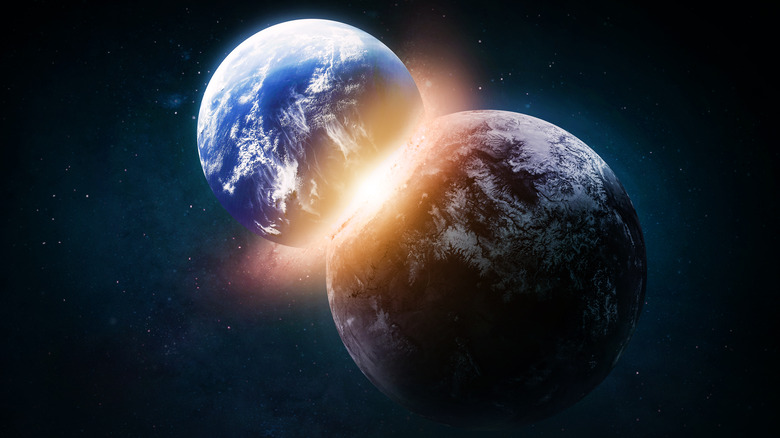This Is What Would Happen If There Was No Friction
Imagine you are skiing down a mountain and realize you are about to hit a tree. You veer frantically from side to side, the soft snow spiraling upward, growing cold and stiff against your face. From behind the ski mask, you can see the disaster that's about to unfold and brace yourself. With all your might, you push your pointy poles into the soft earth beneath you.
The tree is now so close that you can make out each and every branch that stands to hit you in the face. The poles are wedged between you and the ground, your feet threatening to come right out from underneath you. Yet, even in this moment of tension, you can feel yourself slowing down as your poles rub against the snow-swept mountainside. The force behind the slowing of your momentum is called friction (via Victoria State Government Education). Without it, you would just keep falling — literally forever.
Kinetic friction is what causes moving objects to resist one another
Continuing on with the skiing example, kinetic friction is the interaction that happens between the poles and the slopes. This constant force of resistance is what makes it possible for the skier to slow down, stop, and even maneuver from side to side. According to Live Science, kinetic friction is generated when two solid objects move against one another. However, there is also a kind of friction known as static friction that keeps objects that are not in motion in a stationary state. You probably thought that levitating inanimate objects was something that could only happen if we lost our precious gravity, didn't you? No, dear friend — Earth is much more complicated than that.
The role that friction plays in our reality is as mysterious as it is important, and scientists are still researching these complex interactions. Friction exists in liquids and solids, in space, on planets, and across galaxies. From what we humans have observed, there is no environment you can go to in order to escape the force of friction ... until now. Welcome to the simulation.
In a world without friction, we would all be eternally falling
The reason friction plays such a pivotal role in life as we know it is because it affects every object in the universe that is in motion. While you might not always be conscious of this, whenever you are running, walking, or even standing up, you are an object in motion. Without the force of gravity holding things down, you, like a rocket, would float into space (via NASA). Without the force of friction to create tension between your foot and the ground, you would fall forever, because the only direction an object can move in without friction is down (via Socratic Q&A).
And this is just what would happen on an individual level if, for some hypothetical reason, friction only stopped working for you. If friction ceased to exist entirely, you might imagine all of civilization — from tiny parakeets to giant elephants, from skyscrapers to oceans — sliding down to the lowest possible point. Everything would be figuratively and literally suspended throughout the universe. Pretty surreal — this idea of everything falling forever all at once. But we wouldn't just be falling, we would also be freezing.
We would all be frozen, because there's no such thing as fire without friction
There are several methods of fire-making, and while only one of them has friction in its name, all of them boast friction as a requirement. Without this imperative force, it would be impossible to strike up that brilliant flame that keeps us warm, lights our way, and maintains our spot at the top of the food chain. It's a cold world for humans when there's no such thing as fire, and not just because we'd all be vulnerable to freezing to death (via The Hiking Authority). Technically, the human race could survive without these seemingly necessary flames. After all, our ancestors did it. However, it has been argued by biologist Richard Wrangham that fire is the element that essentially "makes us human" (via Smithsonian Magazine). According to his theories, if we were unable to consume cooked food, we'd have fewer brain cells and behave in a primitive manner similar to less intellectually advanced mammals.
Whether you subscribe to this theory that a world without fire lowers our position on the food chain is neither here nor there. Even if we were not reduced to sniveling, snarling, savage beasts, fire is used in virtually every aspect we associate with our modern lifestyle — from cooking to metal bending, from vehicular operation to electricity. Without it, we'd have to suffer cold showers, raw meals, no internet, and dark hallways once the sun goes down. Most mortifying of all, this would mean the slow, painful death of melty cheese fries and terrible, but highly addictive Tik Tok videos. Yikes! And of course, none of this would matter much since, in case you forgot, we are all falling eternally while freezing internally in this world without friction — an unfathomable abyss.
There's nothing to hold onto in a friction-less world
Staring out into a world where everything is falling, your instincts would tell you to grab hold of something, anything, and clutch it for dear life. Unfortunately, in a world without friction, that would be impossible for a wide variety of reasons. The most immediate reason is the fact that you need friction to move your body. Yes, friction is present even in your joints (via Body Physics: Motion to Metabolism). If by some miracle, you managed to defy the laws of science and move your arms, it wouldn't matter because there would be absolutely nothing to hold onto.
Remember that static friction that was mentioned earlier? Well, without it, you'd have nothing to grab as you eternally fall to your death (via Live Science). Part of the problem is that friction is a critical component to picking things up. Without it, objects would just slip out of your hands as if they were slathered in peanut butter. More importantly, without static friction to keep non-moving objects stationary on an incline, these objects would either be falling with you or on you. Neither scenario is ideal.
In a world with no friction, your sneakers and bicycle tires would be pristine
This world without friction isn't all downside (get it?). There are a couple of perks if you're a sneakerhead or a squeaky-clean car enthusiast. Because friction is essentially a force of resistance between two objects, it's the main component that causes wear and tear (via Live Science). Without friction, sure, we'd all be plummeting to our deaths, but at least we'd be doing so in the cleanest sneakers this side of the Milky Way. Incidentally, we would have a mighty impressive collection of tires that looked like they've never been used because everyone in this alternate reality would just be haphazardly sliding around in their vehicles.
On a larger scale, friction plays a huge part in the abrasion that causes erosion. And erosion is responsible for all sorts of things like mountains, valleys, and coastlines (via Britannica). So, without friction, the surface of everything from our sneakers to our planet would look drastically different. Of course, the biggest difference would be everything collapsing into itself and existentially ceasing to exist.
In a world without friction, there is no world or Universe to speak of
By now, you've accepted this frictionless existence where you live in a perpetual state of falling down. You are frozen and freezing — motionless at the bottom of the food chain. The only thing you have going for you is a crispy set of kicks and a jacket that will never fade — even if you do. Unfortunately, accepting this reality would prove counterproductive because you'd never be able to live in it.
According to the What If YouTube channel, which specializes in wacky doomsday scenarios such as this one, the world could not last a full minute without friction. In fact, the whole universe would collapse in on itself if friction ceased to exist. So not only would you have people and oceans sliding downward, valleys and mountains flattening from lack of erosion, but if you could watch this event through a telescope, you would witness whole planets literally melting into one another until you and everything around you fell out of existence. Whoa.






